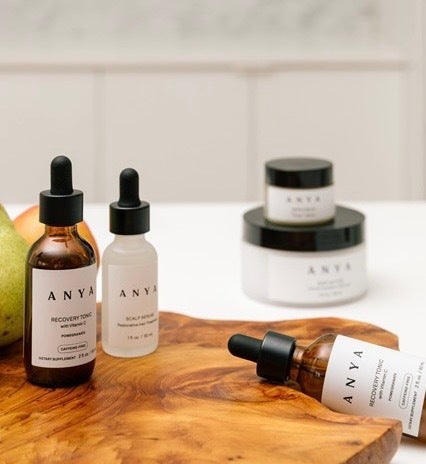A mother who breastfeeds exclusively produces about 25 to 30 ounces of breastmilk a day. In broad strokes, that breast milk is composed of water, fats, carbohydrates, proteins, vitamins and minerals. But look closer, and that breast milk is a direct result of what the mother eats and drinks.
A brief primer on the process: The mother eats a sandwich; the sandwich is broken down by her digestive tract and the proteins, fats, and sugars are absorbed into her bloodstream. The hormone prolactin signals to her mammary glands to take the nutrients from her blood and turn them into breast milk. Breast milk is produced and the baby is fed.
What the mother eats has an effect on the quality and the quantity of the breastmilk she produces, according to Stephanie de Wolfe, a postpartum care provider, who has an MPH in community health science from Tulane School of Public Health and Tropical Medicine, and specializes in food literacy education, and is a trained community herbalist. “The baby experiences everything.”
We spoke with de Wolfe and nutritionist Julie Devinsky about the connection between nutrition and breastmilk production. Here are 6 tips to support lactation.
Consume more.
“There is a lot of energy expended in milk production, which is why it is critical to compensate with extra nutrient dense foods,” says Devinsky. A mother who is exclusively breastfeeding requires anywhere from 350 to 500 extra calories per day, depending on her height and weight.
Choose whole foods.
“A diet that supports healthy lactation is rich in whole foods with as few processed foods as possible,” says de Wolfe. That may be because, according to a study published last year, the vitamins, minerals, phytonutrients, fiber, and probiotics in whole food are more bioavailable, meaning your body knows how to process them. Whole foods include fresh fruits, vegetables, and legumes, whole fat milk, goat cheese, oats, and rice. “If you don’t know what a food’s natural source is, it's probably not something that you want to eat,” says de Wolfe. To paraphrase author Michael Pollan, don’t eat anything your great grandmother wouldn’t recognize as food.
Eat plenty of good fat.
“One of the most common misconceptions around whole fats and cholesterol is that they might not be good for you,” says de Wolfe. “It's actually the opposite: fats are essential for maintaining hormone health, and that becomes really important during the postpartum and lactation phase.” Remember, it’s the hormone prolactin that tells your breast tissue to produce breast milk, and the hormone oxytocin that helps your body release breast milk. Good sources of healthy unsaturated fats include walnuts, eggs, avocados, coconut oil, olive oil, and fish like salmon that have omega-3 fatty acid.
Get your vitamins.
There are nutrients that your body will demand more of when you are breastfeeding, like vitamin B12, calcium, and zinc. “If you are on any type of restrictive diet—gluten-free, vegan, paleo—it is good practice to cover all your bases and take a multivitamin formulated for a breastfeeding mom,” says Devinsky. If you are strictly vegan, you should continue your B12 supplement or make sure your multivitamin has sufficient amounts.

Anya Postnatal Multivitamin + Omega-3
Mix in spices.
“Galactogogues are herbs that can help activate lactation,” explains de Wolfe. De Wolfe suggests creating a customized blend with spices like garlic, ginger, anise, cinnamon, nutmeg, and fennel seed. Keep it on the counter so it’s always easy to scoop it into smoothies or sprinkle into stews and soups. “One teaspoon of that blend in a serving can support you and your milk supply.”
Drinking a lactation tea is another way to incorporate herbs that support breastmilk production. “Moringa, fennel seed, and fenugreek have long, ancient legacies of supporting mothers through lactation. For example, in the Philippines and many parts of West and Central Africa, moringa leaf is used to support nutrition and lactation during postpartum. Native to India but well adapted all over the globe, Moringa is rich in iron, calcium, vitamins, and antioxidants, adding an excellent boost of nutrients to milk supply,” says de Wolfe. Since a number of factors can affect milk supply, using a blend of herbs that warm, soothe and encourage lactation can support various experiences of breastfeeding.
Anya’s lactation tea is formulated with 8 galactagogues, including moringa, fennel, fenugreek, blessed thistle and ginger.

Lactation Tea
Hydrate, hydrate, and eat hydrating foods.
The recommended amount of water can vary for each person, but generally we are supposed to be drinking eight to 12 glasses a day. When you are a breastfeeding mother, you’ll want to add at least four extra glasses to compensate for the 25 to 30 ounces of fluid your body is producing a day according to Wolfe. “It’s important to drink water whenever you are thirsty, if you notice that you are not going to the bathroom, or if you have dark urine,” says de Wolfe. Eating leafy greens can help fight water retention. “Spinach, chard, or dandelion greens lightly steamed are going to support lactation,” says de Wolfe.
Anya tonics were formulated specifically to help mothers drink more water each day. Add a few droppers of the Recovery Tonic for fresh flavor and a nutritional boost.

Recovery Tonic
That Guinness thing?
Maybe you’ve heard rumors that drinking the dark Irish stout can boost lactation? Well, it technically can. But, “it is not the alcohol itself that is responsible for the increase in prolactin,” says Devinsky. “It is the polysaccharide found in barley that is responsible for the lactogenic effect.” You can achieve a similar effect with non-alcoholic beer or simply by adding barley to your salads, stews, or vegetable dishes.
Julie Devinsky is an adviser to Anya.






